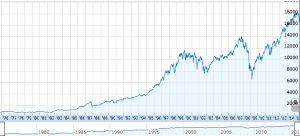In today’s world, young professionals must invest in their financial future. Investing and saving for retirement is the probably the most important investing you’ll need to do in your life. We’re living in a different era from our parents and grandparents, as we’re unable to rely on social security (grandparents) nor do we have a pension from our company that we work for (parents) and therefore the burden of investing in our future falls to us in the form of 401(k) or Roth IRA plans. To be clear, in the absence of a large retirement fund that we’ve saved over many years in our life, retirement will be a bleak scene for us. We’ll be unable to realistically work as we once did (thus earning less) and unfortunately will be faced with the thought of not working or working much less, while unable to pay our bills. We’ll have to rely on the government financial aid (which social security is just a few hundred each month) or rely on family/friends.
The whole idea and push behind saving for retirement NOW when we’re young is twofold: compound interest and having a long period of time to smooth out any ups and downs. Compound interest is the fact that interest or gains you earn now can be reinvested and grow more in the future. So with a 10% return, $100 would turn into $110. Then you’d have $110 to invest in the bank instead of $100, earning you $11 in interest instead of just $10. Over a long period of time, that ‘compounding’ really adds up and you’re earning more on your money. Investing early also allows you to smooth out the natural ups and downs of the market. The financial recession of 2008 would have demolished anyone who started in 2007 and ended investing in 2009. However, the years past 2008 saw a rebound (and increase) of the crash so as long as you kept your money invested, you ended up making it all back (and some more). Over time (since we’ve had a stock market), it’s overall been an upward trend, so any downs are countered by ups and by keeping your money invested, it should grow over time.
So, it’s important to a) save for retirement and b) start saving now. Easy enough right? What’s shocking is how few young professionals actually anything for retirement, much less save an adequate amount for retirement (recommended 15%). 2/3 of Americans don’t contribute to a 401(k), with the average balance being $5,000. Despite knowing that we should and knowing that we should NOW, so few of us do. In an attempt to change that, I wanted to put together a few reasons why I’ve heard people say they don’t save, and a few counter arguments to try to move them past those excuses.
I don’t have enough money
This excuse is probably the most common one I hear from young professionals today. I’d say that for 90% of them it’s probably not a valid excuse but I’ll give 10% the benefit of the doubt that it is a valid excuse. Let’s talk about ‘not having enough money’. In a young professionals life, there are certainly mandatory expenses that you should spend you money on instead of investing for retirement: rent, gas, groceries, cell phone bill, minimum debt payments. Outside of that though, I’d argue that you do have enough money to save for retirement. Eating out, shopping for new clothes, going out with friends on the weekend all are not ‘required’ and instead should be viewed as ‘extras’. Saving something for retirement is super important and I’d put it above ‘extras’ but right under ‘mandatory expenses’. Now I’m not saying that tomorrow you should cut out everything but ‘mandatories’ and save 15% but I am saying that you should start cutting out some ‘extras’ in favor of saving for retirement. Don’t feel pressured to save a ton right now, start with something small: 1-2% if it’s an employer 401(k) that comes out of your paycheck or maybe $25-$50 each month if it’s an IRA (individual retirement account). If you can afford to go out Friday night for dinner/drinks, you can afford to save $25-$50 for retirement each month. Finally, I’d argue that if you don’t have money now, it won’t feel like you have money later, even as your income grows. Lifestyles have a tendency to grow with your income so if you don’t get in a habit now it won’t get any easier!
I have other things I want to spend my money on (i.e not a priority)
A continuation of the previous point, often time young professionals are often times ‘distracted’ and ‘focused on other things’ right now in their life. A lot of times ‘extras’ in terms of expenses get moved into the ‘mandatory’ category and we feel trapped by our own spending, always having to keep up with friends, family, or last month’s expenses. We end up putting more ‘extras’ into our ‘mandatory’ expenses by buying a much nicer car than we really need, renting an apartment that’s in a more fun part of town or that’s bigger than we really need, going on fancier vacations or buying nicer clothes. I realize that we all work hard at our jobs and that not having fun now certainly isn’t a popular opinion but I’m trying to propose that we can find a happy medium between the two and have some fun now while saving for retirement. Back to my previous point: start saving $25-$50 or 1-2% of your salary to retirement and cut out that extra drink, that additional night eating out or saying ‘no’ to that new shirt.
I don’t trust the stock market and feel safer with my money in the bank
Many of us are old enough now to remember the financial crisis of 2008 when the stock market lost so much so quickly. We certainly live in a weird, turbulent and dangerous world today. With this in mind, some young

professionals would prefer not to risk their hard earned money in something that could lose value. Instead of facing the ups and downs, we just put our money in a savings account, where it is safe and sound. In the US our banks guarantee our money against bank default up to $250k, so if you’re under that amount you won’t lose money. I get a lot of this concern; losing money sucks. However, there’s really no alternative. Savings accounts (like my Capital One online savings account) pays close to 1%. Most traditional banks (like my Bank of America) pay like 0.1%. I’m certainly not going to be able to retire well on 0.1-1%. What’s worse is that inflation (which typically runs at like 2%) means that I’m actually losing money by keeping it in a savings account (2%>1%), as my money is worth less than it was last year with inflation. On the other hand, my 401(k) at work this year has a year to date (YTD) return of 22%. Granted this is a good year but I think since I’ve started working my retirement has returned at least 10% each year. I know that it’s worrisome to invest and face the risk of losing money, but there really aren’t many alternatives. To be able to retire, you’re going to have to take on risk.
I don’t know how to
This is probably the 2nd most common response that young professionals don’t know how to invest and save for retirement. Thankfully it’s not too difficult, and with a little coaching, you can get it setup in about 15 minutes (I know because I’ve helped two friends do so! Let’s talk through the two scenarios to get you setup:
1) I have a 401(k) through my employer. Perfect! Start by navigating to your employee portal (or other repository information about benefits) and find information related to “401(k)”. It should be relatively easy; you’ll create a username linked to your company account and then designate the amount you’d like to contribute. The recommended about is 15%, but I do realize that most of us might not be able to accomplish that. Start with something small, perhaps 5%. Definitely contribute as much it takes to get the free match (likely 2-5%); don’t throw away free money! Instead of a flat amount (i.e. $50 each paycheck), I like a percentage so that amount will auto increase as you get raises. A lot of companies will offer a 401(k) option or a Roth option. A 401(k) option allows you to not pay taxes now and then pay taxes when you take the money out. It’ll also allow you to deduct that from your taxable income, which is pretty sweet. A Roth option makes you pay taxes now but when you withdrawal your money when you retire, you’ll do so tax-free. There are different schools of thought on which is better (mostly centering around what you think taxes will do in the future) but I personally like the idea of my money growing, doubling and tripling again and again, all tax free. I personally do 1/3 pre-tax (401(k)) and 2/3 post-tax (Roth).
Once you’ve set your contribution, you’ll now select your investments. Most plans offer about a dozen funds for you to invest in. I highly recommend either a target date fund (i.e. Retirement 2055), which will auto-adjust for risk as you get older or an index fund. Be sure that you look at the expenses and keep them low (under 1% if not closer to 0). If you don’t have any of those options, follow this strategy: 25% growth, 25% large cap, 25% international, 25% medium cap. From there it should all be on autopilot, with money being pulled out each paycheck and going into the account. Note that at any time you can increase or decrease your contributions (guess which one I recommend) or change your investment options.
2) I do not have a 401(k) option from my employer. Fair enough, not all employers offer a retirement plan. Arguably doing it on your own through an IRA (individual retirement account) often provides more options at a lower cost. To open an IRA, you’ll need to do so through a financial institution. First check and see if your bank offers one (mine, Bank of America does so I keep it there for ease), and start there as I advise keeping money in fewer places if possible. If not, I’d strongly recommend Vanguard (not an advertisement but my honest opinion) as they have many low cost options. Other alternatives could be the other online brokerages (eTrade, Fidelity, Scwab etc), and all are solid options. Head to their website and start an application. You’ll put in some personal info (including your social security number) and it should be a quick approval once complete. Once complete, you’ll be able to setup a link to your other banking institution (to move money into your retirement account) and then start moving money in. I recommend automating this process if possible to make it painless and so you won’t forget. Start contributing once/twice a month a certain amount of money. From there, you’ll face similar options for where you want your money to go. Similarly, I’d recommend investing in either a target date fund or an index fund (Vanguard has a good one – VTI that I’m in). It should be relatively straightforward to do a little research to find those types of funds.
Finally; if you’re still struggling or stuck – shoot me an email, ben at youngmoneyfinance.com and we’ll set some time up to walk through the process (just a small charge for my time). It’ll definitely be worth getting you setup!
Saving for retirement shouldn’t be hard or difficult. With 15 minutes of effort, you’ll be able to start saving for your financial future and put your retirement contribution on autopilot to make it easy! So, after reading that, what else is holding you back from saving for retirement? Anything that I’ve missed? I really hope, and would love to hear of any success stories that you may have. If you’re running into any trouble, definitely shoot me an email (ben at youngmoneyfinance.com) and I’ll be happy to help!


 Personal Finances are certainly top of mind for many of us. If you're looking to get serious about improving your financial situation, we've got lots of great materials all over this site! Additionally, we realize that there's a lot of noise out there, and so we created PERSONAL FINANCIAL GUIDES focused on topics with all the info you need, and without any of the noise/ads/clickbait.
Personal Finances are certainly top of mind for many of us. If you're looking to get serious about improving your financial situation, we've got lots of great materials all over this site! Additionally, we realize that there's a lot of noise out there, and so we created PERSONAL FINANCIAL GUIDES focused on topics with all the info you need, and without any of the noise/ads/clickbait.